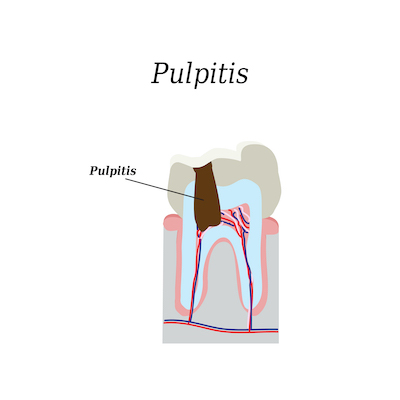Effective Remedies for Pulpitis
 Dental pulp is a substance that exists within the center of your teeth. It contains living connective tissue along with blood vessels and nerves.
Dental pulp is a substance that exists within the center of your teeth. It contains living connective tissue along with blood vessels and nerves.
The pulp serves several vital roles for helping to maintain your oral health.
For instance, it helps to prevent your teeth from getting brittle by maintaining blood flow that keeps them nourished.
You can also thank dental pulp for letting you know when something is wrong with your tooth. The pulp can become inflamed in response to trauma or infections and lead to issues with tooth sensitivity.
When you come into our office complaining about a tooth that hurts when you bite down or eat something hot or cold, then we may diagnose you with pulpitis.
In most cases, tooth decay is the cause of pulpitis, but it can also be caused by trauma to the tooth. The most effective fix for the condition depends upon the underlying cause as well as the overall health of your tooth.

Remove Tooth Decay and Place a Filling
Tooth decay can reach deep into the enamel where it begins to irritate the pulp. If the decay is not too extensive, then it is sometimes possible to do a simple filling. After the filling is complete, you may have some temporary soreness as the pulp recovers.
Reduce Pressure on the Nerves
At times, a filling may be placed too high. When this happens, the filled tooth hits the one above or below it with too much force. Over time, this repeated pressure can irritate the nerves in the pulp and lead to pain and pressure. High fillings can be adjusted during a quick office visit, and it is best to do this as soon as possible to prevent irreversible pulpitis.
Perform a Root Canal and Crown Procedure
 Severe tooth decay or a fracture can leave openings in the enamel that allow bacteria to reach the dental pulp. Once this happens, infection occurs in the pulp that leads to inflammation and causes it to become necrotic.
Severe tooth decay or a fracture can leave openings in the enamel that allow bacteria to reach the dental pulp. Once this happens, infection occurs in the pulp that leads to inflammation and causes it to become necrotic.
A root canal is performed to remove the affected pulp from the tooth.
After the pulp is removed, the tooth is weakened due to the loss of enamel as well as the blood supply that helped to keep it nourished.
We then place a dental crown over the tooth to restore its strength and prevent further damage.
Eliminate the Infection With Antibiotics
Pulpitis frequently occurs due to an infection within the tooth that we can treat with antibiotics. Often, medication is prescribed before or after a root canal procedure to make sure that the infection is fully gone.
If you take antibiotics before a root canal, then make sure to follow through with the rest of your treatment. Although the pain may be gone, the infection can come back until you address the underlying cause.
Extract the Tooth
An extraction is another option that ends the pain of inflamed dental pulp by removing the problem completely. You might choose an extraction if a previous root canal is failing or if the tooth is severely damaged to the point that it is not repairable.
After you heal from the extraction, we can use implants or a denture to replace the tooth.

The throbbing pain created by irritated dental pulp can reach severe levels that keep you up at night. Always address mild tooth pain and sensitivity when it first begins. If we catch this condition in the early stages, then it may still be reversible with a simple filling.
Noble Dental Care is accepting new patients and would love to be your Tempe dentist. Call our office today for an appointment. We look forward to meeting you!
Related Page: Remedies for Pulpitis